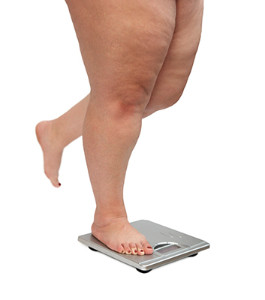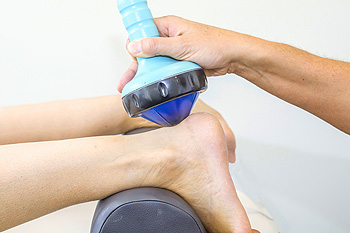 Recent research has shown that approximately 70 percent of the population in the Bahamas are obese. This typically impacts the general health of the feet as a result of the additional weight the feet must endure. An increased BMI, or body mass index, generally accompanies any weight that is gained. This may produce unwanted foot conditions that may include plantar fasciitis, tendonitis, arthritis and general “wear and tear” of the bones, ligaments, and tendons. Additionally, the structure of the foot may be negatively affected, which may aid in difficulty maintaining an exercise program. While purchasing shoes, it’s important to choose shoes that fit correctly, which may help to diminish a portion of the pain that may be experienced. If you feel you are obese and would like additional information about this condition on how it may affect the feet, please consult with a podiatrist.
Recent research has shown that approximately 70 percent of the population in the Bahamas are obese. This typically impacts the general health of the feet as a result of the additional weight the feet must endure. An increased BMI, or body mass index, generally accompanies any weight that is gained. This may produce unwanted foot conditions that may include plantar fasciitis, tendonitis, arthritis and general “wear and tear” of the bones, ligaments, and tendons. Additionally, the structure of the foot may be negatively affected, which may aid in difficulty maintaining an exercise program. While purchasing shoes, it’s important to choose shoes that fit correctly, which may help to diminish a portion of the pain that may be experienced. If you feel you are obese and would like additional information about this condition on how it may affect the feet, please consult with a podiatrist.
Obesity has become very problematic at this point in time and can have extremely negative effects on the feet. If you’re an obese individual and are concerned about your feet, contact Dr. Morris Stribling from Foot Care of Central San Antonio. Our doctor can provide the care you need to keep you pain-free and on your feet.
Obesity and your Feet
Since your feet are what support your entire weight when standing, any additional weight can result in pain and swelling. Being overweight is one of the main contributors to foot complications.
Problems & Complications
Extra Weight – Even putting on just a few extra pounds could create serious complications for your feet. As your weight increases, your balance and body will shift, creating new stresses on your feet. This uneven weight distribution can cause pain, even while doing the simplest tasks, such as walking.
Diabetes – People who are overweight are at serious risk of developing type-2 diabetes, which has a drastic impact on the health of your feet. As you get older, your diabetes might worsen, which could lead to loss of feeling in your feet, sores, and bruises. You could also become more prone to various infections.
Plantar fasciitis – Pressure and stress that is placed on muscles, joints, and tendons can trigger plantar fasciitis, which is an inflammation of tissue that forms along the bottom of the foot.
If you have any questions please feel free to contact our office located in Central San Antonio, TX. We offer the newest diagnostic and treatment technologies for all your foot and ankle needs.
Read more about How Obesity Affects Your Feet There is a technique that is referred to as extracorporeal shock wave therapy, which is also known as ESWT, that may aid in treating certain foot conditions such as plantar fasciitis. There are two types of shock wave treatments that may be used, and these are referred to as low-energy and high-energy treatments. Low-energy treatments are typically administered over a period of time and may produce mild discomfort. The opposite may be true of the latter, and is often performed in a single treatment, which may often require general anesthesia. The purpose of these treatments is to promote healing of the tissues and surrounding areas affected by the foot condition. Recent research has shown little effectiveness of these treatments and many patients may still have pain after treatment. It’s important to speak with a podiatrist if you would like additional information about shockwave therapy.
There is a technique that is referred to as extracorporeal shock wave therapy, which is also known as ESWT, that may aid in treating certain foot conditions such as plantar fasciitis. There are two types of shock wave treatments that may be used, and these are referred to as low-energy and high-energy treatments. Low-energy treatments are typically administered over a period of time and may produce mild discomfort. The opposite may be true of the latter, and is often performed in a single treatment, which may often require general anesthesia. The purpose of these treatments is to promote healing of the tissues and surrounding areas affected by the foot condition. Recent research has shown little effectiveness of these treatments and many patients may still have pain after treatment. It’s important to speak with a podiatrist if you would like additional information about shockwave therapy.
Shockwave therapy is a treatment commonly used to treat various injuries and conditions, particularly plantar fasciitis in the feet. To learn more, consult with Dr. Morris Stribling from Foot Care of Central San Antonio. Our doctor can provide the care you need to keep you pain-free and on your feet.
Shockwave Therapy
Shockwave therapy is a new treatment option designed to treat bone conditions such as tennis elbow, shoulder pain, and others. Shockwave therapy uses high intensity sound waves that are directed to the affected tissues of the body with pinpoint accuracy. The effects are very beneficial, leading to a production of collagen fibers, eliminating inflammation.
Who Benefits from Shockwave?
Shockwave is recommended for patients suffering from heel pain and associated problems. Heel pain is a common condition which can be caused by obesity, overexertion, and spending a substantial amount of time on hard floors with your feet exposed and unsupported.
Fast and Easy
The therapy is actually a simple process that can leave patients feeling better the very next day. Shockwave therapy is not as dramatic as it sounds. It enables more blood flow to effected areas, addressing the source of the problem and allowing treatment to last for a long time.
Treatment & Recovery Time
Shockwave treatment will enable your feet to recover quickly. This is especially important since surgery is not required. It is cost effective and does not require the use of anesthesia. This treatment is a better option to surgery, since it is proven safe.
If you have any questions, please feel free to contact our office located in Central San Antonio, TX. We offer the newest diagnostic and treatment technologies for all your foot and ankle needs.
Read more about Treating Heel Pain with Shockwave Therapy It’s beneficial for children to learn at an early age how to properly take care of their feet. One way to accomplish this includes teaching them how to wash and dry their feet daily, especially in between the toes. Additionally, learning how to properly trim the toenails is a crucial element, which may prevent unpleasant foot conditions from developing, such as ingrown toenails. If your child should complain about heel pain, predominantly in the morning, a plantar’s wart may have developed. This may be avoided by teaching your child to wear appropriate shoes in the shower and pool areas, which may prevent the fungus that causes this condition to occur, to stop from entering the feet. If you notice your child scratching their feet, an ailment that is referred to as athlete's foot may have developed. Research has shown this may be avoided by wearing clean shoes and socks and showering or bathing in a clean area. It’s advised to have your child visit a podiatrist to learn about proper techniques for caring for the feet.
It’s beneficial for children to learn at an early age how to properly take care of their feet. One way to accomplish this includes teaching them how to wash and dry their feet daily, especially in between the toes. Additionally, learning how to properly trim the toenails is a crucial element, which may prevent unpleasant foot conditions from developing, such as ingrown toenails. If your child should complain about heel pain, predominantly in the morning, a plantar’s wart may have developed. This may be avoided by teaching your child to wear appropriate shoes in the shower and pool areas, which may prevent the fungus that causes this condition to occur, to stop from entering the feet. If you notice your child scratching their feet, an ailment that is referred to as athlete's foot may have developed. Research has shown this may be avoided by wearing clean shoes and socks and showering or bathing in a clean area. It’s advised to have your child visit a podiatrist to learn about proper techniques for caring for the feet.
The health of a child’s feet is vital to their overall well-being. If you have any questions regarding foot health, contact Dr. Morris Stribling of Foot Care of Central San Antonio. Our doctor can provide the care you need to keep you pain-free and on your feet.
Tips for Keeping Children's Feet Healthy
If you have any questions, please feel free to contact our office located in Central San Antonio, TX. We offer the newest diagnostic and treatment technologies for all your foot care needs.
Read more about How to Care for Your Child's Feet Many people who are elderly may develop uncomfortable foot conditions as they age. Research has shown there may be many reasons for this to occur. This may include a loss of cushioning in the skin and the nails losing moisture, which may become brittle. If you are contending with poor circulation, any sores that may be present may prove difficult to heal. People of all ages should check their feet regularly to look for cuts, blisters, or ingrown toenails. This is especially true of the older population who may experience difficulty in seeing clearly or bending down. Some patients find it helpful to use a mirror to see the bottom of their feet, or may ask a family member or friend for assistance. It’s important to have your feet measured frequently to ensure the correct size shoe is worn, in addition to wearing socks that fit snugly but are not too tight. If you find conditions such as ingrown toenails, bunions, or corns have developed, it’s suggested to speak with a podiatrist as quickly as possible for correct treatment.
Many people who are elderly may develop uncomfortable foot conditions as they age. Research has shown there may be many reasons for this to occur. This may include a loss of cushioning in the skin and the nails losing moisture, which may become brittle. If you are contending with poor circulation, any sores that may be present may prove difficult to heal. People of all ages should check their feet regularly to look for cuts, blisters, or ingrown toenails. This is especially true of the older population who may experience difficulty in seeing clearly or bending down. Some patients find it helpful to use a mirror to see the bottom of their feet, or may ask a family member or friend for assistance. It’s important to have your feet measured frequently to ensure the correct size shoe is worn, in addition to wearing socks that fit snugly but are not too tight. If you find conditions such as ingrown toenails, bunions, or corns have developed, it’s suggested to speak with a podiatrist as quickly as possible for correct treatment.
Proper foot care is something many older adults forget to consider. If you have any concerns about your feet and ankles, contact Dr. Morris Stribling from Foot Care of Central San Antonio. Our doctor can provide the care you need to keep you pain-free and on your feet.
The Elderly and their Feet
As we age we start to notice many changes in our body, but the elder population may not notice them right away. Medical conditions may prevent the elderly to take notice of their foot health right away. Poor vision is a lead contributor to not taking action for the elderly.
Common Conditions
Susceptible Infections
Diabetes and poor circulation can cause general loss of sensitivity over the years, turning a simple cut into a serious issue.
If you have any questions please feel free to contact our office located in Central San Antonio, TX. We offer the newest diagnostic and treatment technologies for all your foot and ankle needs.
Read more about Elderly Foot Care